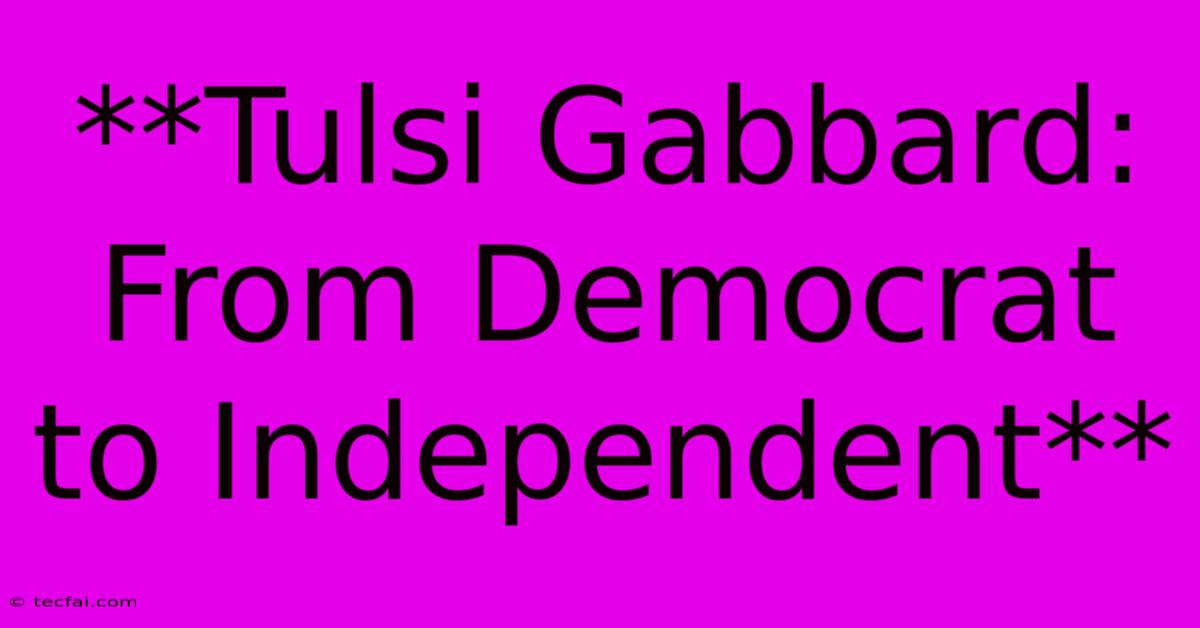**Tulsi Gabbard: From Democrat To Independent**

Discover more detailed and exciting information on our website. Click the link below to start your adventure: Visit Best Website tecfai.com. Don't miss out!
Table of Contents
Tulsi Gabbard: From Democrat to Independent
Tulsi Gabbard, a former Democratic Congresswoman from Hawaii, made headlines in October 2022 when she announced her departure from the Democratic Party and her decision to register as an Independent. This move, coming after years of expressing discontent within the party, sparked significant debate and discussion about the future of American politics.
Gabbard's Political Journey: From Rising Star to Dissenter
Gabbard's political career began with a strong affiliation to the Democratic Party. She served in the Hawaii House of Representatives before being elected to the US House of Representatives in 2012. Initially, she was considered a rising star within the party, particularly known for her progressive stances on issues like healthcare and environmental protection.
However, over time, Gabbard began to voice criticisms of the Democratic Party, particularly its foreign policy and its approach to issues like identity politics. She became a vocal critic of military interventionism, expressing skepticism about the wars in Iraq and Afghanistan. This stance, along with her admiration for figures like Bernie Sanders and her willingness to challenge the party establishment, led to a growing disconnect between Gabbard and the Democratic Party leadership.
The 2020 Presidential Campaign: A Turning Point
Gabbard's 2020 presidential campaign further solidified her status as an outsider within the Democratic Party. Although her campaign was ultimately unsuccessful, it provided a platform for her to articulate her political vision, which emphasized a focus on peace, economic justice, and a more inclusive approach to foreign policy.
During the campaign, Gabbard faced criticism from some Democratic Party members for her views on foreign policy and for her close relationship with Indian Prime Minister Narendra Modi. She was also accused of aligning herself with Russian interests, a charge she strongly denied.
The Decision to Leave the Democratic Party
The culmination of Gabbard's growing dissatisfaction with the Democratic Party came in October 2022 when she formally announced her departure. In a statement, Gabbard cited the party's embrace of "neoliberal warmongering" and its focus on "identity politics" as key reasons for her decision. She declared that the Democratic Party had become "too extreme" and that it no longer represented her values.
Impact and Implications
Gabbard's decision to leave the Democratic Party has been met with mixed reactions. Some have applauded her for her courage in standing up to the party establishment, while others have criticized her for her alleged alignment with right-wing ideologies.
The broader implications of Gabbard's move remain to be seen. Some analysts believe her decision could be a sign of a growing trend of disaffection with both major political parties, particularly among younger voters who feel increasingly alienated by the current political landscape. Others argue that Gabbard's departure is more of an individual decision and is unlikely to have a significant impact on the broader political landscape.
Conclusion
Tulsi Gabbard's journey from rising Democratic star to independent political figure is a story of evolving values, political disillusionment, and the complexities of modern American politics. Her decision to leave the Democratic Party has sparked a conversation about the future of the party and the direction of American politics as a whole. Whether her departure signals a broader trend of political realignment or simply reflects her own personal journey, her story will undoubtedly continue to be followed with interest.

Thank you for visiting our website wich cover about **Tulsi Gabbard: From Democrat To Independent**. We hope the information provided has been useful to you. Feel free to contact us if you have any questions or need further assistance. See you next time and dont miss to bookmark.
Featured Posts
-
Cheyanne Casalegno Wife Of Gavin
Nov 14, 2024
-
Ex Congresswoman Gabbard In Trumps Sights
Nov 14, 2024
-
Rainfall Disrupts Flights Forces Thousands To Evacuate
Nov 14, 2024
-
East Enders And Corrie Actor Timothy West Passes
Nov 14, 2024
-
Hugh Jackman Sutton Foster Friendship Through Years
Nov 14, 2024
